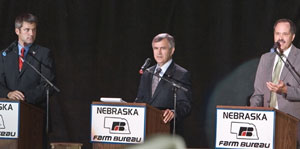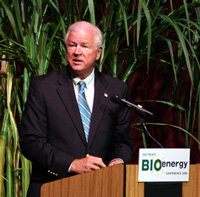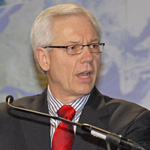 Doubts about commercial opportunities for cellulosic ethanol are evaporating:
Doubts about commercial opportunities for cellulosic ethanol are evaporating:
“It is no longer a question of if we are able to produce cellulosic ethanol, but when,” POET CEO Jeff Broin said.
Jeff announced POET’s commitment to develop a commercial cellulosic ethanol plant in Elmersville, Iowa at the Ethanol Conference and Trade Show in Omaha, Nebraska earlier this month. Construction on what POET is calling “Project Liberty” will begin in 2009 and the company expects the facility to be online by 2011. But, POET promises to have a smaller pilot-scale facility up and running by the end of this year.
Jeff says now is an optimal time to take advantage of cellulosic energy because, as he sees it, the industry has sustained strong progress with investments from private industry and academia:
“The stars are beginning to align for cellulosic ethanol,” Jeff said.
POET’s commercial cellulosic plants will process feed stock corn cobs and corn fiber. But, corn isn’t the only source for cellulosic ethanol production that’s poised to go commercial. Bill Schafer, senior vice president of business development Range Fuels, says his company is investing in processing woody biomass for cellulosic ethanol production in Georgia.
In this DomesticFuel Cast, we hear from Jeff Broin, CEO of POET, and Bill Schafer, senior vice president of business development Range Fuels. Here is the Domestic Fuel Cast #8:
[audio:http://www.zimmcomm.biz/domesticfuel/df-podcast-08.mp3]
You can also subscribe to the DomesticFuel Cast using the following url/feed link: http://www.zimmcomm.biz/domesticfuel/domestic-fuel-cast.xml.


 Hundreds of supporters have been
Hundreds of supporters have been  According to OSU professor of chemical and biomolecular engineering Umit Ozkan, a new catalyst can makes hydrogen from ethanol with 90 percent yield, at a workable temperature, and using inexpensive ingredients.
According to OSU professor of chemical and biomolecular engineering Umit Ozkan, a new catalyst can makes hydrogen from ethanol with 90 percent yield, at a workable temperature, and using inexpensive ingredients. Republican Mike Johanns, Democrat Scott Kleeb and Green Party candidate Steve Larrick all discussed the important issues of energy, climate change and renewable fuels – although most of the sparks flew between Johanns and Kleeb.
Republican Mike Johanns, Democrat Scott Kleeb and Green Party candidate Steve Larrick all discussed the important issues of energy, climate change and renewable fuels – although most of the sparks flew between Johanns and Kleeb. Motorsports legend Jack Roush joined a group of auto company executives, fleet operators and propane marketers to demostrate to the press and public some propane-fueled vehicles in New York City.
Motorsports legend Jack Roush joined a group of auto company executives, fleet operators and propane marketers to demostrate to the press and public some propane-fueled vehicles in New York City. “Aside from its superb engineering, this F-150 is a propane alternative-fueled vehicle that has an established refueling infrastructure to support it,” said Jack Roush, chairman of the board of Roush Enterprises and CEO and co-owner of Roush Fenway Racing, Livonia, Michigan. “It has lower greenhouse gas emissions than gasoline and diesel pickups and costs less to operate, and it contributes to the reduction of America’s dependency on foreign oil.”
“Aside from its superb engineering, this F-150 is a propane alternative-fueled vehicle that has an established refueling infrastructure to support it,” said Jack Roush, chairman of the board of Roush Enterprises and CEO and co-owner of Roush Fenway Racing, Livonia, Michigan. “It has lower greenhouse gas emissions than gasoline and diesel pickups and costs less to operate, and it contributes to the reduction of America’s dependency on foreign oil.”
 A new study from Purdue University shows that buses that have been running 10 percent biodiesel are reducing pollution without any loss of fuel economy.
A new study from Purdue University shows that buses that have been running 10 percent biodiesel are reducing pollution without any loss of fuel economy.  The National Biodiesel Board has teamed up with two companies to launch a pilot program to show how much lower emissions are using biodiesel. NBB, along with Chicago-based Indigenous Energy, LLC, developers of emissions tracking systems, and Los Angeles-based States Logistics, a fleet and logistics company using clean technology, to put together the six-month over-the-road test.
The National Biodiesel Board has teamed up with two companies to launch a pilot program to show how much lower emissions are using biodiesel. NBB, along with Chicago-based Indigenous Energy, LLC, developers of emissions tracking systems, and Los Angeles-based States Logistics, a fleet and logistics company using clean technology, to put together the six-month over-the-road test. Senator Saxby Chambliss of Georgia is proud that his home state is playing a role in the production of alternative, domestic fuels.
Senator Saxby Chambliss of Georgia is proud that his home state is playing a role in the production of alternative, domestic fuels. “Continuing to develop renewable energy is a key component of President Bush’s strategy to reduce America’s dependence on foreign oil,” Dorr said. “This meeting is an opportunity for business owners, citizens and agricultural producers to discuss the best ways to harness the untapped renewable energy resources in rural areas.”
“Continuing to develop renewable energy is a key component of President Bush’s strategy to reduce America’s dependence on foreign oil,” Dorr said. “This meeting is an opportunity for business owners, citizens and agricultural producers to discuss the best ways to harness the untapped renewable energy resources in rural areas.”